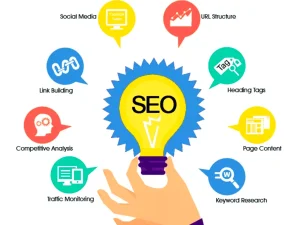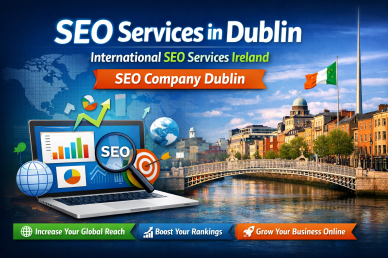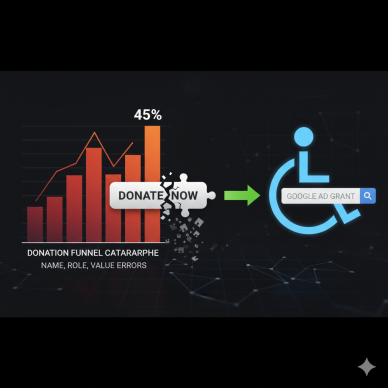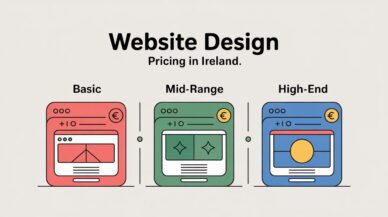Website conversions are pivotal to the success of any eCommerce enterprise. E-commerce will swiftly evolve in 2024, necessitating businesses to adapt to these shifts and retain a competitive edge. Conversion strategies require continual updates to stay in line with current trends. The average conversion rate across various sectors within eCommerce spans from 2% to 4%. Effective eCommerce website design and user-friendly interfaces are vital for higher conversion rates. Investing in professional website design services can markedly enhance user experience. Businesses in Dublin, for example, gain from specialised website design Dublin services that address local market demands.
Understanding Website Conversions in eCommerce & online stores
Definition and Importance
What are eCommerce Conversions?
eCommerce conversions occur when visitors to your online store complete a desired action. This action could be purchasing a product, signing up for a newsletter, or downloading an app. Each conversion represents a step towards achieving business goals. Understanding website conversions is crucial for optimising your eCommerce design. A well-structured eCommerce website design encourages more conversions by seamlessly guiding users through the purchasing process.
Why eCommerce Conversions Matter for Online Retailers
Conversions directly impact the revenue of online retailers. Higher conversion rates mean more sales and increased profitability. Effective website design plays a pivotal role in boosting these rates. Businesses must invest in professional website design services to ensure their sites are user-friendly and visually appealing. A well-executed eCommerce design attracts visitors and converts them into loyal customers. Retailers in Dublin, for instance, benefit from specialised website design Dublin services that cater to local preferences and trends.
Current Trends in eCommerce & Online Stores
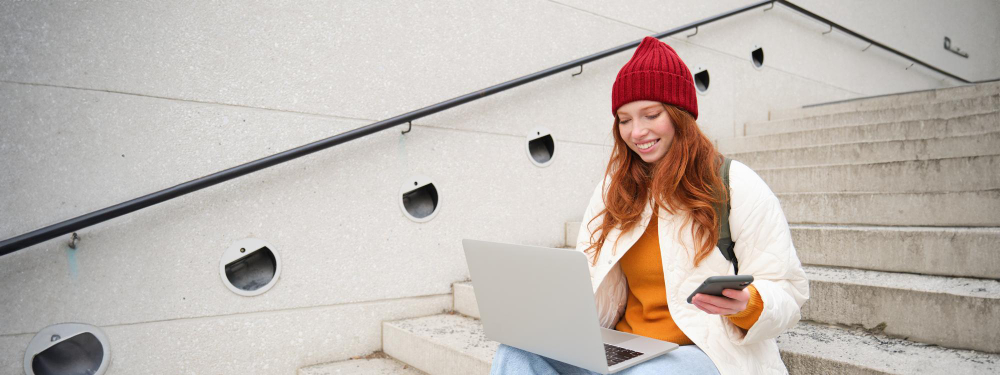
Consumer Behaviour Changes
Consumer behaviour in eCommerce is constantly evolving. Shoppers now demand personalised experiences and seamless navigation. Businesses must adapt their eCommerce website design to meet these expectations. A responsive design ensures that users can access your site from any device. Mobile shopping continues to rise, making mobile-friendly website design essential. Retailers must focus on creating intuitive interfaces that enhance user experience and boost website conversions.
Technological Advancements Impacting Conversions
Technology plays a significant role in shaping eCommerce trends. Artificial intelligence and machine learning provide insights into consumer preferences. These technologies enable businesses to personalise their offerings and improve website conversions. Augmented reality offers virtual try-ons, enhancing the shopping experience. Implementing these advancements in your eCommerce design can set you apart from competitors. Businesses should consider investing in innovative website design services to stay ahead.
Proven Conversion Strategies to Boost Conversions on e-commerce platforms & Online businesses

Optimising User Experience through eCommerce Website Design
Website Navigation and Design
Website navigation plays a crucial role in enhancing user experience. Users need easy access to product categories and information. A well-structured navigation menu guides users seamlessly through the site. Clear labels and intuitive design elements improve usability. Businesses should invest in professional website design services to achieve this. An effective eCommerce website design encourages users to explore more products. This exploration often leads to higher website conversions.
The aesthetic appeal also matters in website design. Visual elements should align with brand identity. Consistent colour schemes and typography create a cohesive look. High-quality images and videos enhance product presentation. These elements contribute to an engaging eCommerce design. The right design choices can significantly boost conversion rates. Retailers in Dublin can benefit from specialised website design Dublin services. These services cater to local market preferences and trends.
Mobile Responsiveness
Mobile responsiveness is vital for modern eCommerce websites. Many consumers shop using smartphones and tablets. An eCommerce website design must adapt to different screen sizes. Responsive design ensures optimal viewing on all devices. This adaptability enhances user experience and increases website conversions.
Fast loading times are essential for mobile users. Slow pages lead to high bounce rates and lost sales. Businesses should optimise images and scripts for faster performance. A streamlined mobile interface simplifies navigation. Simple layouts and touch-friendly buttons improve usability. Professional website design services can help achieve these goals. Retailers in Dublin can leverage website design Dublin expertise. This expertise ensures mobile-friendly designs that meet local demands.
Personalisation Techniques

Tailored Product Recommendations
Personalisation enhances customer engagement and satisfaction. Tailored product recommendations increase the likelihood of purchases. Businesses can use customer data to suggest relevant products. These suggestions create a personalised shopping experience. Personalised experiences lead to higher conversion rates.
Artificial intelligence aids in personalisation efforts. Machine learning algorithms analyse user behaviour. These insights help refine product recommendations. Effective personalisation requires continuous data analysis. Businesses should invest in advanced eCommerce design tools.https://www.ada-asia.com/insights/how-to-improve-website-conversion-rate These tools enable dynamic and accurate recommendations. Personalisation drives revenue and customer loyalty.
Personalised Email Marketing
Email marketing remains a powerful conversion strategy. Personalised emails capture attention and drive action. Segmented email lists allow targeted messaging. Businesses can send tailored offers and product updates. These messages resonate with specific customer segments.
Compelling subject lines increase open rates. Engaging content encourages click-throughs and conversions. Businesses should track email performance metrics. Continuous testing and optimisation improve results. Personalised email marketing enhances customer relationships. This approach fosters brand loyalty and repeat purchases.
Leveraging Social Proof

Customer Reviews and Testimonials
Social proof builds trust and credibility. Customer reviews and testimonials influence purchasing decisions. Positive feedback reassures potential buyers. Businesses should prominently display reviews on product pages. This transparency boosts confidence and conversions.
Encouraging customers to leave reviews is essential. Follow-up emails and incentives can prompt feedback. Responding to reviews shows commitment to customer satisfaction. Addressing negative feedback demonstrates accountability. Social proof elements enhance the overall eCommerce design. These elements contribute to higher website conversions.
Influencer Collaborations
Influencer collaborations expand brand reach and visibility. Influencers have loyal followings and trusted voices. Partnering with influencers introduces products to new audiences. Authentic endorsements drive interest and conversions.
Businesses should choose influencers aligned with brand values. Relevant partnerships yield better results. Influencers can create engaging content showcasing products. This content resonates with their followers and boosts conversions. Influencer collaborations enhance social proof and brand credibility.
Streamlining Checkout Process

Streamlining the checkout process is crucial for improving website conversions. A smooth and efficient checkout experience encourages customers to complete their purchases. Many businesses lose potential sales due to complicated and lengthy checkout procedures. Implementing effective conversion strategies in your eCommerce design can significantly reduce cart abandonment rates.
Simplified Payment Options
Simplified payment options play a vital role in enhancing eCommerce website design. Customers prefer quick and easy payment methods. Offering multiple payment options caters to diverse customer preferences. Credit cards, digital wallets, and bank transfers should be available. Businesses should ensure that payment gateways are secure and reliable. Security builds trust and encourages customers to finalise their purchases.
Fast payment processing is essential for retaining customers. Slow transactions lead to frustration and abandoned carts. Businesses should optimise their payment systems for speed and efficiency. Professional website design services can help integrate seamless payment solutions. Retailers in Dublin can benefit from specialised website design Dublin services. These services address local market needs and preferences.
Guest Checkout Features
Guest checkout features simplify the purchasing process. Customers appreciate the option to buy without creating an account. This convenience reduces barriers to purchase and boosts website conversions. Businesses should offer guest checkout as part of their eCommerce website design. A streamlined guest checkout process enhances user experience.
Data collection should remain minimal during guest checkout. Request only essential information to complete the transaction. Lengthy forms deter customers from completing their purchases. Clear instructions guide users through the checkout process. Professional website design services can assist in creating intuitive checkout flows. Retailers in Dublin can leverage Website Design in Dublin expertise. This expertise ensures checkout designs meet local expectations.
Case Studies:
- Amazon’s One-Click Checkout: Amazon introduced the one-click checkout feature, which allows customers to purchase items with a single click. This innovation has significantly increased website conversions by simplifying the payment process.
- ASOS Guest Checkout: ASOS implemented a guest checkout option, resulting in a noticeable decrease in cart abandonment rates. The simplified process encouraged more customers to complete their purchases without the hassle of account creation.
Incorporating these conversion strategies into your eCommerce design can increase website conversions. Simplified payment options and guest checkout features enhance user experience and drive sales. Businesses should invest in professional website design services to implement these strategies effectively. Retailers in Dublin can benefit from Website Design in Dublin services tailored to local market demands.
Advanced Tactics for 2024 in Ecommerce Website Development Dublin

Utilising AI and Machine Learning
Artificial Intelligence (AI) and Machine Learning (ML) are revolutionising eCommerce website design. These technologies offer advanced conversion strategies to enhance user experience and boost website conversions.
Predictive Analytics for Customer Insights
Predictive analytics uses data to forecast future customer behaviour. Businesses can use these insights to tailor their eCommerce design. Personalised recommendations increase the likelihood of purchases. Predictive analytics helps identify trends and preferences. This knowledge allows businesses to adjust their strategies accordingly. Implementing predictive analytics in your eCommerce website design can increase website conversions.
Chatbots for Enhanced Customer Support
Chatbots provide instant customer support on eCommerce websites. These AI-powered tools handle common queries efficiently. Chatbots improve user experience by offering quick responses. Customers appreciate the convenience of immediate assistance. Chatbots reduce the workload on human support teams. This efficiency leads to faster issue resolution and increased satisfaction. Incorporating chatbots into your eCommerce design enhances customer support and boosts website conversions.
Implementing Augmented Reality into eCommerce Web Development.

Augmented Reality (AR) offers immersive experiences in eCommerce website design. AR provides customers with a realistic view of products. This technology serves as a powerful conversion strategy.
Virtual Try-Ons for Products
Virtual try-ons allow customers to visualise products before purchasing. This feature is particularly useful for fashion and beauty items. Customers can see how clothing fits or how makeup looks. Virtual try-ons reduce uncertainty and increase confidence. This assurance encourages more purchases and improves website conversions. Implementing virtual try-ons in your eCommerce design can set your business apart.
Interactive Product Demos
Interactive product demos engage customers through hands-on experiences. AR technology showcases product features in detail. Customers can explore functionalities and benefits interactively. Interactive demos enhance understanding and interest. This engagement leads to higher conversion rates. Businesses should consider adding interactive demos to their eCommerce website design.
Case Studies:
- Sephora’s Virtual Artist: Sephora introduced an AR feature called Virtual Artist. Customers can try on makeup virtually using their smartphones. This innovation has increased website conversions by providing a personalised shopping experience.
- IKEA Place App: IKEA launched an AR app that allows customers to place furniture virtually in their homes. The app helps customers visualise how products fit in their spaces, leading to improved website conversions.
Implementing AI, ML, and AR in your eCommerce design can significantly enhance user experience. These advanced tactics offer innovative ways to engage customers and boost website conversions. Businesses should invest in professional website design services to integrate these technologies effectively. Retailers in Dublin can benefit from website design Dublin services tailored to local market demands.
Recap the key business strategies for boosting eCommerce conversions.
Focus on optimising user experience, personalisation, leveraging social proof, and streamlining checkout. Embrace advanced tactics like AI, Machine Learning, and Augmented Reality. These technologies revolutionise personalised shopping experiences and enhance customer engagement. Staying updated with trends ensures competitiveness in the evolving eCommerce landscape. Implement these strategies to improve conversions and foster customer loyalty. Businesses should invest in professional website design services to integrate these innovations effectively.














